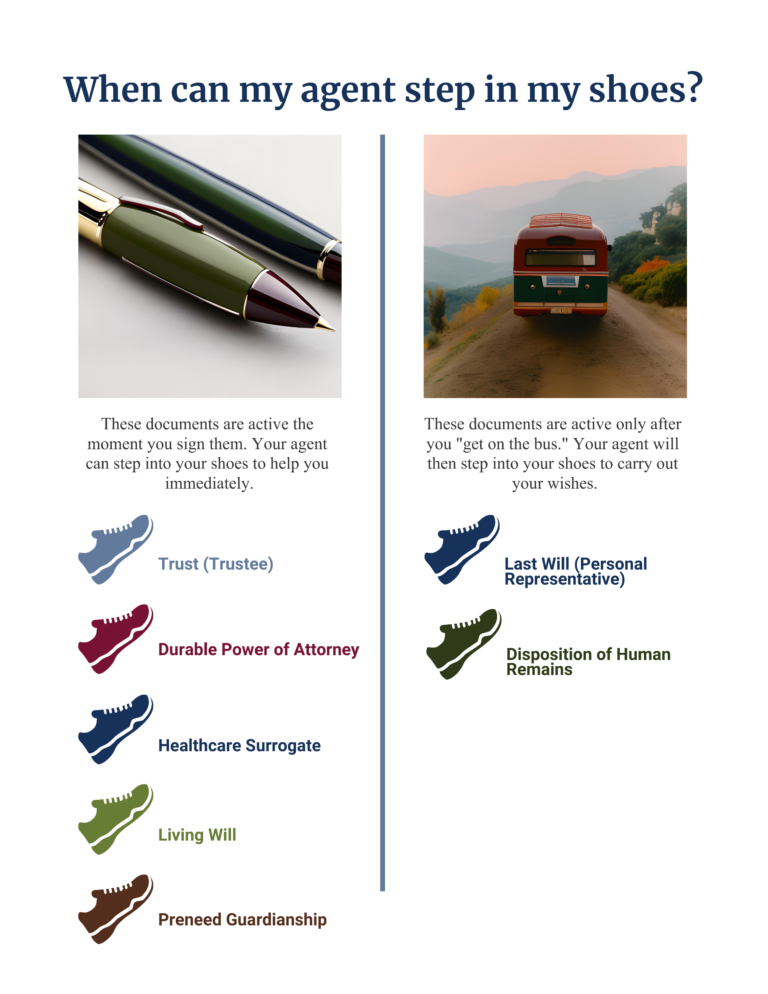When it comes to your health and affairs, it’s crucial to have a plan in place and to identify people who can step into your shoes and help you. With the right legal documents, they will have full legal authority to represent your interests and ensure your wishes for yourself and your loved ones are honored.
It is helpful to think of estate planning documents in two categories – there are documents that allow someone to step in your shoes and help you while you are alive, and there are documents that allow them to help you after you “get on the bus.” There is one document that is active from the time you sign, and stays active after you’re on the bus – your trust.

The Essential Legal Documents
A Durable Power of Attorney, Healthcare Surrogate, and Living Will are essential for absolutely everyone. We offer these documents as a stand alone package, though they are included with every will-based or trust-based plan. These three documents are active as soon as they are signed and notarized.
Parents, if you have an adult child, we would like to help you help them. After your child turns 18, you will need these documents to authorize you to work with landlords, doctors, university or college admissions professionals, loan officers, banks, and others on your child’s behalf.

Your Durable Power of Attorney
Active when you sign; inactive when you "get on the bus"
Your agent in your durable power of attorney (DPOA) can step into your shoes if you are out of the country, sick, or otherwise need help. Legally, they have the right to do anything you might do – sell your home, pay your bills, file your taxes, hire attorneys to represent you, access your accounts, and the list goes on. They are also known as your attorney-in-fact.
Choose someone who you trust completely. They have a lot of power to help you. And they also have a lot of power, period. In our Durable Power of Attorney document, we detail twenty-three separate actions (known as super powers) that they may take, with your authorization, at any given time to handle your financial and civil affairs.
We also counsel our clients to find the best, trusted “Paperwork Person,” someone organized and thorough.

Your Healthcare Surrogate
Active when you sign; inactive when you "get on the bus"
Your healthcare surrogate is like the guardian of your health, stepping into your shoes to make medical decisions when you are alive and expected to get better, but cannot advocate for yourself. This document comes into play when you are unable to communicate or make decisions about your healthcare, providing peace of mind that your health is in trusted hands.
By appointing a healthcare surrogate, you empower someone to knowledgably discuss your medical needs and ensure that your preferences are respected.
It is good practice to make your that your healthcare surrogate and any successors are up to date on the medications you are taking, any allergies, and any recent medical events or conditions.

Your Living Will
Active when you sign; inactive when you "get on the bus"
Consider the living will your written voice, expressing your wishes regarding medical treatment and end-of-life care. It acts as a guide for healthcare providers and your healthcare surrogate, ensuring that your desires are known and honored.
Unlike the healthcare surrogate document, this is a document that will be used when you are not expected to get better and are relying on a machine or several to sustain life.
The Terri Schiavo case is perhaps the best known instance of why this document is so important.
A Living Will covers a range of scenarios, such as life-sustaining treatments, resuscitation, pain
management, and organ donation. Your living will speaks for you when you cannot
speak for yourself.
Other Recommended Documents
If you’re not able to control your affairs while you are alive, and you must have a Guardian, would you agree with the person Florida would appoint? If not, we recommend you sign a PreNeed Guardian document. This document is filed with the court while you are alive and it is your recommendation of who you would like to serve as guardian of your person and/or guardian of your property in the event you become mentally or physically disabled.
Similarly, if you would agree with Florida’s presumption of who should be in charge of your funeral arrangements, we will give you a document that will state your wishes.
In both cases, Florida presumes that without these documents, the first person in line is your spouse, followed by any adult children, then parents, then siblings.

Your PreNeed Guardianship
Active when you sign; inactive when you "get on the bus"
We use this document to detail the wishes of guardians for your minor children, and also to detail your wishes for yourself if you were required to have a guardian.
How is a PreNeed Guardianship document different than a Durable Power of Attorney?
Although both documents give your chosen person many of the same powers, a guardianship is only activated when a court finds it necessary that you lose your own rights to take care of yourself.
You may also choose to name two different guardians; one guardian may be entrusted with the care of your person and your health, and another guardian may be entrusted with the care of your property.

Your Statement of Authority to Make Funeral Arrangements/Disposition of Remains
Active after you "get on the bus"
The Statement of Authority to Make Funeral Arrangements is a document you can use to prevent a lot of arguing among your family and loved ones., and make sure that someone will step in your shoes and carry out your wishes the way you would have liked.
In Florida, your Personal Representative, the person you name in Your Last Will and Testament, does not have this duty and privilege automatically. We also prefer not to leave these instructions in the Last Will because that document may be found much later than it is needed.
Will-Based and Trust-Based Plans
The biggest differences between a will-based and trust-based plan is what time your agent steps into your shoes.

Your Last Will & Testament
Active after you "get on the bus"
In a will-based plan, your Personal Representative (also known as Executor in other states) can only step in your shoes and carry out your wishes if you have gotten on the bus. All will-based plans will require probate, and they will be in charge of hiring a probate attorney and settling your estate.

Your Trust
Active when you sign; active after you "get on the bus"
In a trust-based plan, your trustee (that will likely be you and perhaps a co-trustee) is in charge. In your documents, you also detail wishes for your successor trustees.
A trust is active from the time your documents are signed and notarized. Your trust allows your trustees to step into your shoes and carry out your wishes for as long as the trust exists.
A trust offers several benefits. One is that a trust -based plan avoids the costly and lengthy process of probate. Another is the asset protection it will offer your beneficiaries, whether from divorce or creditors and predators.
For more about the difference between a will-based and trust-based plan, see our video, If an Estate Plan Were a Car.

